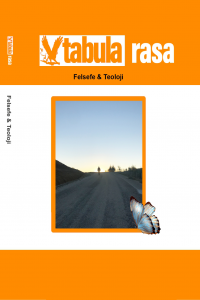Theaitetos Diyalogunda Platon ve Progatoras Arasındaki İlişkiye Dair Bir Değerlendirme
Felsefe tarihi, Platon, Protagoras, Theaetetus, rölativizm.
An Assessment of the Relationship between Plato and Progatoras in the Theaitetos Dialogue
History of Philosophy, Plato, Protagoras, Theaetetus, relativism.,
___
- Balaban, Oded. Plato and Protagoras: Truth and Relativism in Ancient Greek Philosophy. New York: Lexington Books, 1999.
- Burnyeat, Myles. “Protagoras and Self-Refutation in Plato’s Theaetetus”. The Philosophical Review 85/2 (1976): 172-195.
- Burnyeat, Myles. The Theaetetus of Plato, trans. M.J. Lewett. Indiana: Hackett Publish., 1990.
- Crome, Keith. Lyotard and Greek Thought: Sophistry. New York: Palgrave Macmillan, 2004.
- Gillespie, C. M. “The Truth of Protagoras”. Mind New Series 19/76 (1910): 470-492.
- Irwın, Terence. Plato’s Ethics. US: Oxford University Press, 1996.
- Lampert, Laurence. How Philosophy Became Socratic. Chicago: The University of Chicago Press, 2010.
- Lee, Mi-Kyoung. Epistemology after Protagoras: Responses to Relativism in Plato, Aristotle, and Democritus. New York: Clarendon Press, 2005.
- Maguire, Joseph P. “Protagoras—or Plato?”. Phronesis 18/2 (1973): 115-138.
- Manuwald, Bernd. “Protagoras’ Myth in Plato’s Protagoras: Fiction or Testimony?”. Protagoras of Abdera: The Man, His Measure, ed.J. M. Van Ophuijsen vd. Boston: Brill Publish., 2013.
- Morrison, Donald R. “Sokrates”, A Companion to Ancient Philosophy, ed. M.L. Gill and P. Pellegrin. US: Blackwell Publishing, 2006.
- Platon. Theaitetos, çev. Furkan Akderin. İstanbul: Say Yayınları, 2014.
- Platon. Protagoras, çev. Furkan Akderin. İstanbul: Say Yayınları, 2017.
- Price, A.W. “The Irreducibility of the Ethical Plato and Aristotle”. Plato and Aristotle’s Ethics, ed. Robert Heinaman. Burlington: Ashgate Publish., 2003.
- Schiller, F.C.Scott. Plato or Protagoras. London: Marshall, and Co., 1908.
- Stern, Paul. Knowledge and Politics in Plato’s Theaetetus. New York: Cambridge University Press, 2008.
- Taylor, C.C.W. “Socrates the Sophist”. Remembering Socrates, ed. L. Judson ve V. Karasmanis. New York: Oxford University Press, 2006.
- Tschemplik, Andrea. Knowledge and Self-Knowledge in Plato’s Theaetetus. Lanham: Lexington Books, 2008.
- Watson, John. “Plato and Protagoras”. The Philosophical Review 16/5 (1907): 469-487.
- ISSN: 1302-8898
- Yayın Aralığı: Yılda 2 Sayı
- Başlangıç: 2001
- Yayıncı: Mevlüt ALBAYRAK
Pandemi Sonrası Yeni Kent Anlayışı
Hafıza Olarak Yeryüzü Mirası: Olmuş Olanın Düşünceye Daveti
21. YÜZYIL VE MEVLANA’DAN VEFASIZLIK ÜZERİNE KİMİ UYARILAR
KUÇURADİ FELSEFESİNDE İNSANLAŞMA SORUNU OLARAK EĞİTİM
Jean Jacques Rousseau’da Bilim ve Sanatın Yeri
Theaitetos Diyalogunda Platon ve Progatoras Arasındaki İlişkiye Dair Bir Değerlendirme
